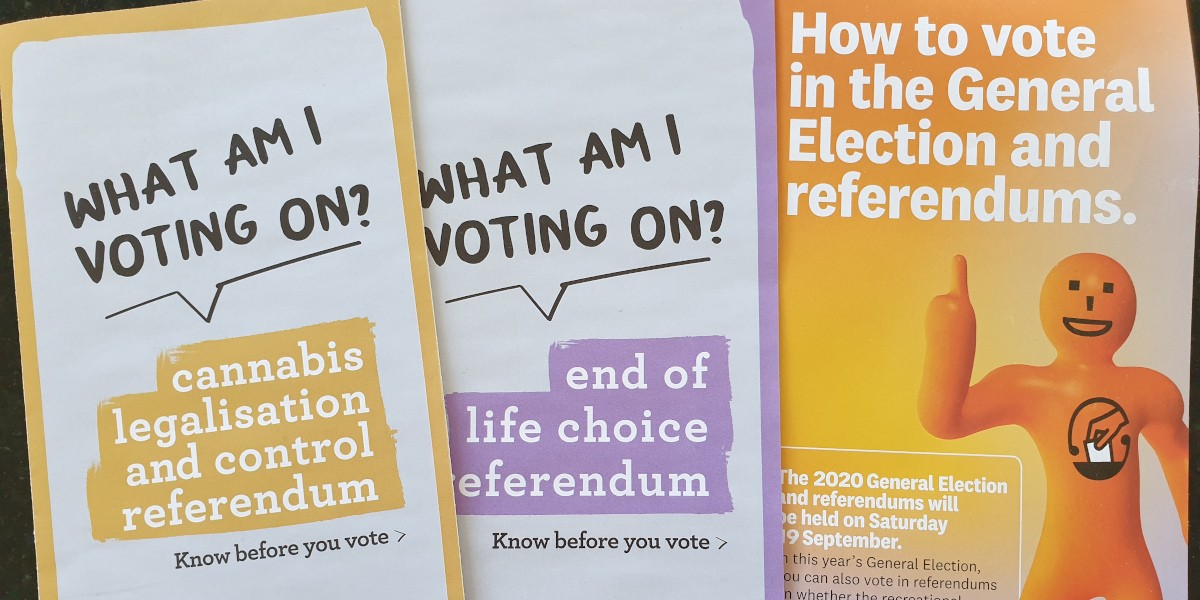Democracy is the theory that the common people know what they want, and deserve to get it good and hard.
— H. L. Mencken
We're right in the middle of being allowed to vote on the greatest issues of our time: smoking joints, state-sanctioned murder, and who gets to manage our national decline over the next three years.
Like most drugs, with cannabis the damage is in the dose and application. Medical cannabis is legal and recreational cannabis is partially decriminalised. The voters are being asked to ratify the legalisation of government-controlled recreational cannabis. Theoretically, you should be responsible for what you consume and the consequences of it. Alas, that's not how our system is set up, and the costs of substance abuse are collectivised. Were this a fuller decriminalisation and deregulation with heavy sanctions for those who victimise others, then it would have my unreserved support. The word "control" in the name of bill does not elicit any enthusiasm from me.
Normalisation of another widely abused form of escapism will not improve the status of our lethargic society. As my friend John Black once joked, "if we really want to help the buggers, we should legalise cocaine."
My prediction is that the vote will fail as the polls suggest. The anti-dope campaign has successfully highlighted and exploited contradictions in the progressive narrative, and while nearly half the population has touched weed at some point in their lives, those experiences appear to have been overly negative.
The only people who will really benefit from cannabis legalisation are potheads, government-approved sellers, and the Treasury. Yet I find myself somewhat ambivalent about the outcome.
Second, we get to vote on government-assisted dying, commonly called euthanasia—a misnomer, after all who wouldn't want a "good death". The careful crafting of words embeds in the public subconscious the idea that the best way to die is at the hands of a trained professional. The name of the bill itself contains the ultimate progressive lie of defining murder as choice.
My prediction is that the referendum will pass handily, as it appears widely desired. Recently we've seen government-assisted dying receive a more rapid uptake than expected in Victoria. The Age noted that "loss of autonomy was the most profound reason applicants gave for requesting assisted dying … Other reasons cited included loss of joy, losing control of body functions and loss of dignity." While the inevitable expansion of assisted dying will free up resources, nothing truly good can come of the normalisation of death-by-government.
Senicide was once the norm in the pagan world, which is why it must be again in the post-Christian. Indeed, commentator Michael Reddell pointed out that "church leaders" of our largest denominations petitioned against assisted suicide with a letter lacking reference to God or Scripture. That alone is evidence that euthanasia is urgently needed in New Zealand. In a society where worship of the State is the majority religion, it will be appropriate to have people ask that the government to put them out of their present misery and into the next.
The anti-suicide campaign has largely failed by focusing on "safeguards" and ignoring that this is primarily a religious vote that will be won by the majority religion. Every post-Christian society must reject the inherent value in life, and allow individuals to both kill themselves, be killed on demand, and kill dependents causing them inconvenience. It's hardly an accident that we end up with expanded infanticide and the start of senicide in the same year.
This brings us to our final topic: democracy.
Your vote matters, sort of. The difference between the Red Team and the Blue Team are over-exaggerated to keep people playing into the system, which is why you should arrange your life in such a way that your family isn't directly impacted by the outcome of an election. This may shock some readers, but it genuinely doesn't really matter to me if the Prime Minister is Jacinda or Judith—both have values that are antithetical to my own. If you're "on the right" and share the ultra-progressive values of Mrs Collins or Mr Seymour, by all means vote for them, but if you have any genuine conservative beliefs then please don't fool yourself into thinking you're buying anything of worth with such a vote.
Let me share a confession: I voted for National in 2017. I don't remember a single thing that the National Party has done as an opposition that I could be proud of. I wasted my vote and I regret it, so learn from my mistake and if you've decided to vote, then at least vote for what you believe in.
That is why I'm running and voting for New Conservative, because the conservative right-wing needs its own piece of the action to play in the political game. Politics is no silver bullet, but we do need a platform and a voice. The rest will come later.
Jacindas and Judiths will come and go. Party vote New Conservative so that we can be there on October 17th, and in three years, and in three decades.
